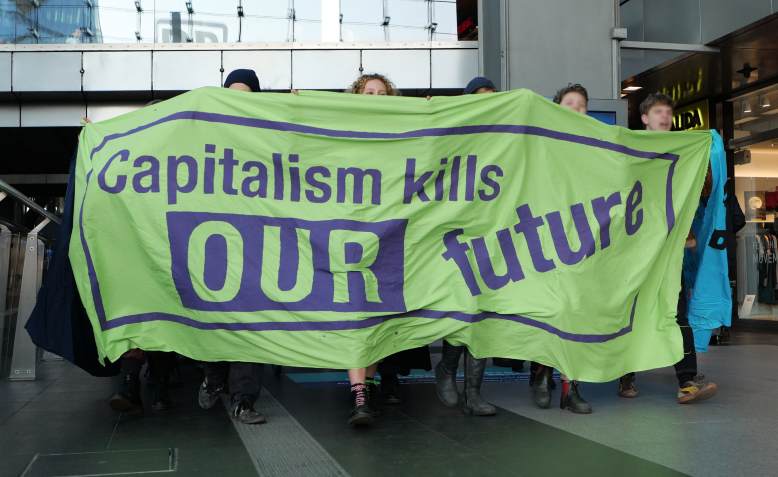 Fridays for Future protest in Berlin. Photo: Leonhard Lenz / Public Domain
Fridays for Future protest in Berlin. Photo: Leonhard Lenz / Public Domain
The Tory ban on ‘anti-capitalist teaching materials’ in schools is a clear attempt to stifle dissent, writes Holly Barrow
For quite some time in the UK, exaggerated fears of a ‘freedom of speech’ crisis have dominated public discourse. With the right-wing mainstream media on side – as national newspapers such as the Telegraph and the Daily Mail have regurgitated this narrative of victimhood – we have been led to believe that the Left in particular is the enemy of free speech; an apparent indictment of political correctness gone mad. University campuses have faced pile ons from both the far-right and centrists alike, bemoaning that our academic institutions are under siege from ‘snowflake’ students who will not tolerate difference in opinion.
This stemmed from student unions deplatforming notoriously divisive figures including the likes of Milo Yiannopoulos, a far-right political commentator. In protesting against providing a platform to those who espouse deeply damaging and hateful rhetoric, students have been caricatured as Orwellian villains who advocate for the policing of thought and censoring of expression.
And yet, when the UK government recently banned English schools from using resources by organisations which have expressed a desire to end capitalism, these bastions of freedom of speech suddenly fell silent. In its guidance to schools, the government deemed anti-capitalist ideology an ‘extreme political stance’, comparable to an opposition to freedom of speech, antisemitism and the endorsement of illegal activity. The irony is not lost on those who recognise this move for what it is: a clear attempt to stifle dissent.
It similarly stated that teachers must not promote ‘victim narratives that are harmful to British society’, leading many to question what exactly is meant by ‘victim narratives’ and how this may be an attempt to suppress the teaching of oppressions faced by minority groups. Such sweeping restrictions constitute a genuine threat to free speech and serve to reinforce the status quo. In banning the use of teaching material from those who have advocated for an end to capitalism, campaigners have voiced their concerns regarding how the UK curriculum is likely to become increasingly whitewashed.
Many critical social and environmental issues such as racism and the climate crisis cannot be divorced from the role of capitalism; to do so would be to disregard a driving force behind such issues. Anti-racist organisations such as Black Lives Matter have discussed the reality that inequality, injustice and exploitation are systemic under capitalism; deeming this an ‘extreme political stance’ to be abolished from teaching allows for only surface-level analysis of complex social movements. A comprehensive understanding of past and present issues requires political and economic context, no matter how unpalatable the government considers this to be.
To understand the government’s motives behind this recent ban, we might turn to another myth which runs firmly alongside the ‘freedom of speech crisis’ inflations: the idea that young people are indoctrinated by left-wing ideology throughout their education. Conservatives have long held the belief that students are politicised and spoon-fed left-wing values by teachers and lecturers – unfounded claims that have consistently been debunked.
Critiques of capitalism do not need to be taught, rather young people are increasingly politicised by their lived experiences, with many having faced two recessions before the age of 18. Speaking to Vice about the government’s ban, Hasan, a 17-year-old from London emphasised:
‘We’ve grown up with ten years of austerity […] Young people are bearing the brunt of all crises, and this is the last resort to let us not be critical of the world we’re about to inherit.’
It is interesting to look at the timing of the government’s recent ban. This summer, both the tragic death of George Floyd in the US and the disproportionate suffering of people of colour during the Covid-19 pandemic sparked crucial global dialogue on racism. International anti-racism protests demanded an end to systemic racism and inequality, with the Black Lives Matter movement urging the UK government to make the British curriculum more inclusive of Black history and to accurately explore the realities of British colonialism and imperialism.
The government rejected this, insisting that RSE lessons already teach “the importance of respecting others, even when they are very different from them, or make different choices or have different preferences or beliefs”. To now ban the use of materials from organisations with an anti-capitalist stance suggests an explicit attempt from the government to restrict anti-racism teaching. Both the Coalition of Anti-Racist Educators (Care) and Black Educators Alliance (BEA) have threatened the government with legal action, noting that such restrictions would dramatically hinder teaching on race in the UK.
Relevant and deeply insightful material from many organisations which advocate for equality – including the likes of charity Inquest – would be deemed unacceptable under the government’s new guidance. This policing of teaching is detrimental to society as a whole and yet such authoritarianism is largely seen through the lens of exceptionalism. Had a potential Labour government under Jeremy Corbyn instructed English schools to refrain from using material by organisations that had heavily criticised socialism, the UK would be in uproar. In fact, socialist leaders in the Global South are demonised across the West as vicious dictators for far less.
The selective outrage towards freedom of speech being under threat in the UK has exposed itself as no more than faux concern. When those in power push an inflated narrative of fear regarding left-wing ‘cancel culture’ while simultaneously imposing vast limitations on academic freedom, we can only conclude that this is a sinister attempt to revive the culture war.
Holly Barrow is a political commentator for the Immigration Advice Service; a UK immigration law firm providing legal support to individuals, businesses and families

